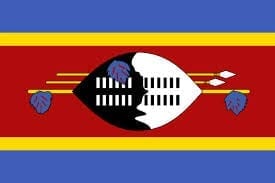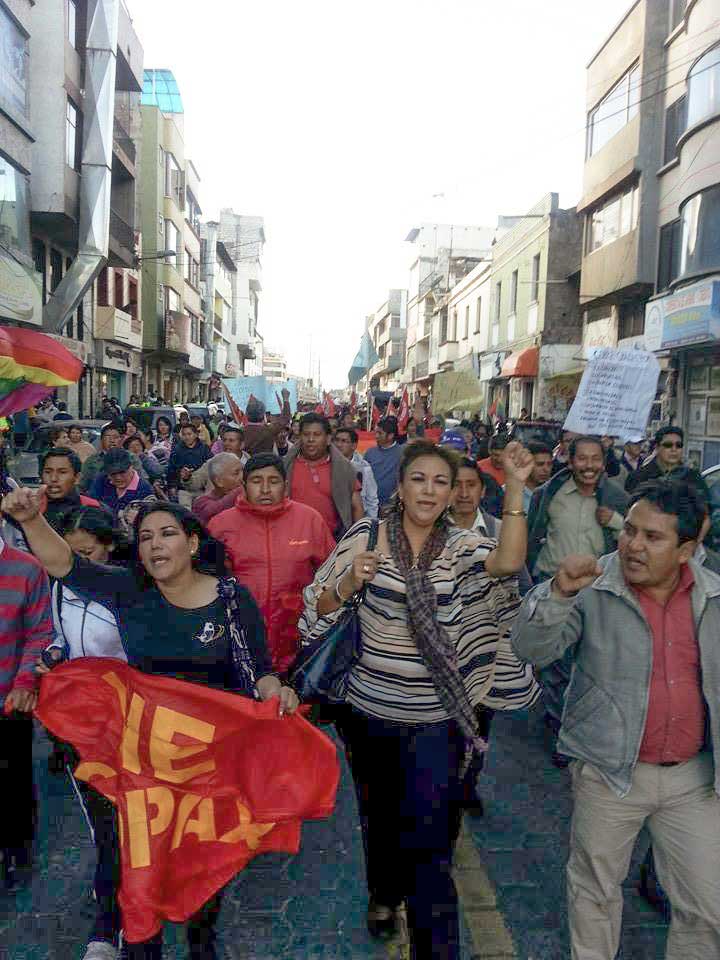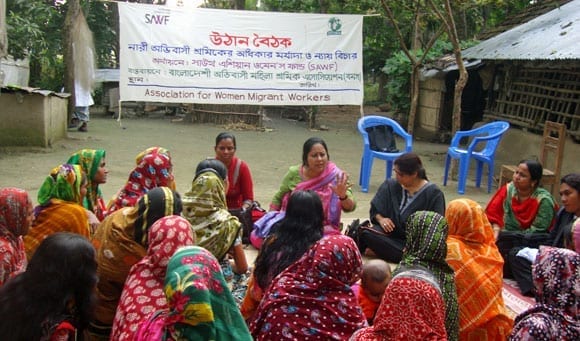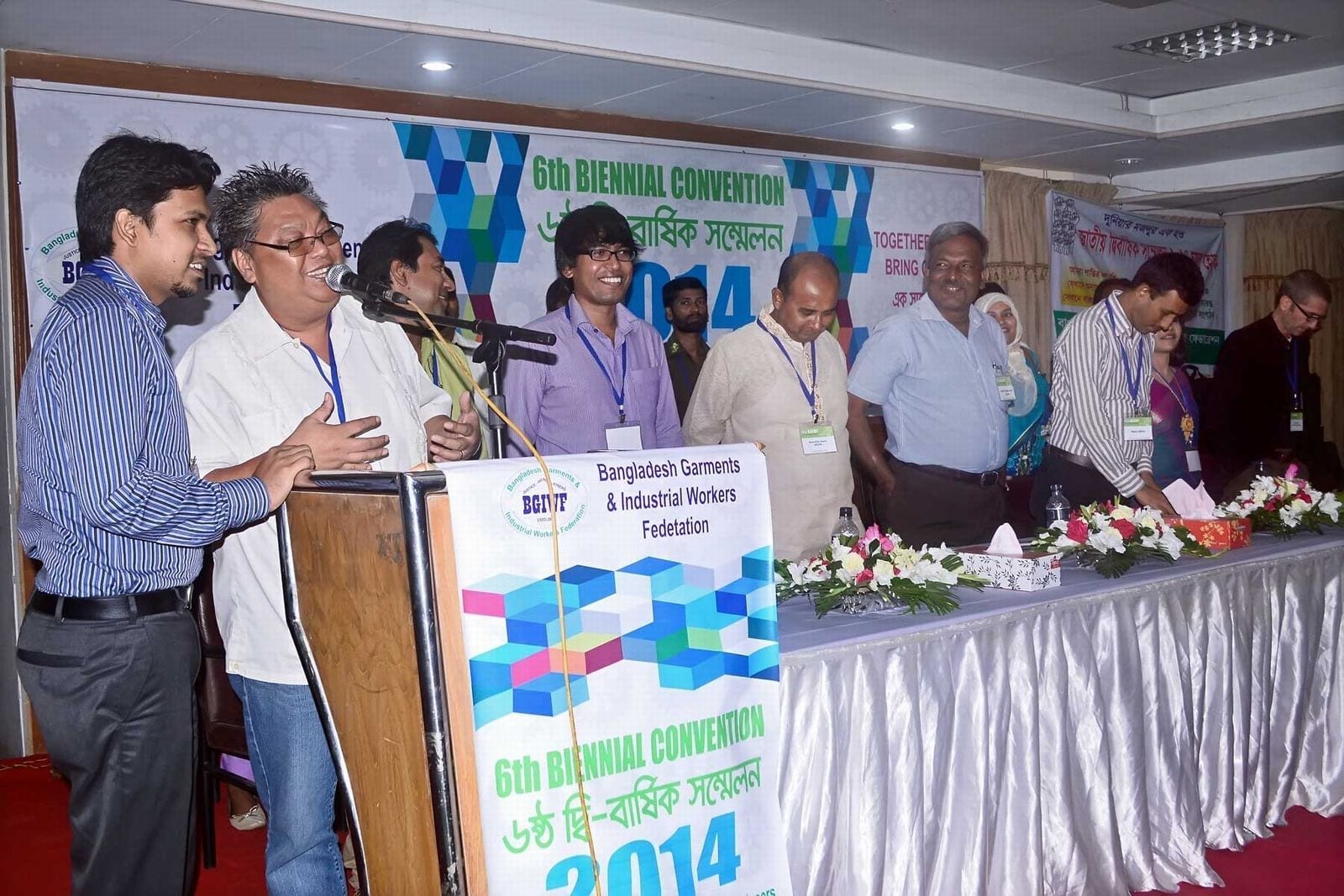
Sep 24, 2014
Workers continue to be sickened at a Swazi textile factory where dozens of workers required hospitalization earlier this month after the plant began using the dangerous chemical butyl acetate to clean clothing stains. The workers, who went to the hospital at their own expense, reported chest pains, severe headaches, vomiting and bleeding, and some collapsed.
Despite the severity of the symptoms and the number of workers affected, the union says management ordered workers back on the job before a thorough health investigation was completed. The company has denied paid sick leave to workers, including one woman who developed bloody blisters in her mouth. Union shop stewards report that the dangerous working conditions have not been addressed and workers continue to become sick, with some vomiting blood. A pregnant worker who experienced swelling was told by doctors in intensive care that her baby may not be breathing.
Butyl acetate, a flammable liquid which targets the central nervous system, should not come in contact with eyes or skin because it causes headaches, skin and eye irritation, affects the upper respiratory system and can cause unconsciousness, according to the U.S. Centers for Disease Control and Prevention.
Shop stewards from the Trade Union Confederation of Swaziland (TUCOSWA), which represents the workers, met with Ministry of Labor officials and managers at the Tex-Ray plant after the initial incident. They requested that all the employees receive medical checkups but say the company provided only a few doctors at the site and assured government officials that a health and safety committee operated in the plant, although one was not created until after workers became ill.
The company has minimized the severity and extent of the illnesses, TUCOSWA leaders say, by reporting fewer incidents of illness to the government and insisting that some workers are ill from other causes. To make up for lost production at the plant, union leaders say the company is forcing workers to toil on day and night shifts. Some 1,600 textile workers produce fleece jackets, knit tops and pants, and children’s clothes at the plant, one of nine garment and fabric factories the company runs in Swaziland.
The plant is based in Matsapha, where most of the country’s industrial factories, primarily textile production, are centered. Workers responding to a recent TUCOSWA survey among 400 textile workers in Manzini, near Matsapha, report they work in harsh and sometimes abusive conditions and say labor laws are routinely violated.
In June, the United States suspended trade benefits to Swaziland, citing the country’s serious worker and human rights violations.The benefits, known as the African Growth and Opportunity Act (AGOA), provide key economic support for countries such as Swaziland.

Sep 24, 2014
When President Obama spoke yesterday at the 2014 Clinton Global Initiative about the value of civil society and the necessity of developing young civil society leaders, the first person he recognized as contributing to the development of his community was Solidarity Center fellow and Kenya social justice activist Walid Ahmed Ali.
Commending him for his work creating jobs at the Kenya-Somali border for unemployed youth, Obama said Ali told him he “strives not just for the idea of democracy,” but “to cement the practice of democracy.
“We thank you Walid for your extraordinary efforts and we stand with you,” the President said.
Ali has been in the United States for the past four months, where he spent the first six weeks at the University of California-Berkeley on a Mandela Washington Fellowship through the Young African Leaders Initiative. He then won an internship through IREX, enabling him to work for the past two months at the Solidarity Center.
Ali, who founded the Lamu Youth Alliance, offers jobless young workers counseling, business classes and small plots of farm land to support themselves in their communities in and around Lamu.
Just off Kenya’s eastern coast, the Lamu archipelago is an environmental oasis where farmers and fishers maintain the livelihoods that have supported their families for generations. Yet a government initiative to turn the area into a massive transportation hub while bringing in tens of thousands of overseas workers to build and operate it, threatens to displace Lamu residents, wreak havoc with the environment and damage the cultural heritage of Lamu Old Town, a World Heritage site UNESCO describes as “the oldest and best-preserved Swahili settlement in East Africa.”
“The indigenous community was evicted for the project and there was no compensation, no training for other jobs,” Ali says. The Lamu Youth Alliance joined the Save Lamu network, a coalition working to develop a bio-cultural community protocol (BCP) to document community practices, rights over communally managed lands and traditional knowledge.
Ali, 29, returns Saturday to Lamu, where he will continue his efforts to push for job creation, especially for the country’s young workers, the vast majority of whom are not employed in the formal economy. Unemployment in Kenya stands at 40 percent, and 70 percent of people unemployed are young workers between the ages of 15 and 35.
Yet despite the country’s dire need for jobs, Ali says half of the 1.5 million workers who will be employed on the Lamu Port Southern Sudan Ethiopia Transport corridor project (LAPSSET) are expected to come from China. The project, slated to become Kenya’s second largest transportation hub, did not go through a procurement process, Ali says, and the wages for the project’s workers do not meet the country’s minimum wage laws.
“I am not against the project, but I want the project to be done according to protocol,” he says.
Ali, who ran for public office last year in his local ward—coming in second among 12 candidates despite being significantly outspent by the winner—will continue working toward his bachelor’s degree in development at the Technical University of Mombasa in Kenya, where he attends classes at night. During the days, he plans to carry on his work with youth by empowering them with leadership skills, increasing their understanding of sustainable development and promoting their rights with the goal of bringing positive change to Kenya.
“My concern is to promote social rights and justice and also gender equality,” he says. “I want to be a good leader with a very strong potential for assisting my community.”

Sep 23, 2014
More than 20,000 trade union members and other Ecuadorans protested regressive government reforms in Quito, the capital, last week, with simultaneous marches in seven other cities.
Those taking part in the rallies oppose proposed constitutional amendments, such as one which would deny new civil service employees rights under the country’s Labor Code, and they object to efforts to pass a proposed Labor Relations Law (Ley Orgánica de Relaciones Laborales) before details of the law are made public.
They also oppose the president’s Executive Decree 16, passed in June 2013, which subjects all nongovernmental organizations to increased oversight and gives the executive branch broad powers to dissolve organizations that it says threaten public peace or interfere with public policy.
Spearheaded by Ecuador’s union movement, including the United Workers Front (Frente Unitario de Trabajadores, FUT) and the Inter-Union Committee (Comité Intersindical ), the march drew support from a broad civil society coalition that included indigenous people’s organizations, teachers, students, medical professionals, retirees and unemployed workers. In a statement calling for the national march, FUT noted that despite the country’s economic gains, largely from lucrative oil exports, and increased government investment in public infrastructure, citizen’s livelihoods have not improved and fundamental rights continue to be constrained.
The proposed Labor Relations Law has not been open to civil society input since it was announced by the Ministry of Labor in May 2013. It is expected to move to the legislature in November.
Declaring the popular protests an attempt to destabilize the country, President Rafael Correa ordered massive deployment of authorities to stop the marches. According to two student organizations, the Federation of Secondary Students (La Federación de Estudiantes Secundarios del Ecuador, FESE) and the Federation of University Students (Federación De Estudiantes Universitarios Del Ecuador, FEUE), at least 100 students were detained by police.
The Inter-Union Committee is comprised of four national unions (sugar, water, municipal and provincial government workers unions); two provincial federations (Esmeraldas and Pastaza); and 50 workplace level unions.
Inter-Union Committee affiliates participating in marches included sugar workers in Milagros; provincial government employees, municipal employees and hospital, water and sanitation workers in Cuenca; water and sanitation workers in Santa Isabel; sugar workers, municipal workers and rural workers in Loja; water and sanitation workers in Manta; provincial government workers in Guayas; and municipal workers in Esmeraldes.
Provincial government unions active in the Inter-Union Committee also sent delegations of workers to participate in the marches in Quito, including workers from Azuay, Guayas, Morona, Pastaza and Imbabura.

Sep 19, 2014
Three times each month, dozens of women gather in dusty courtyards in rural towns in Manikganj, Dinazpur or other districts across Bangladesh to learn all they can about the only means by which they can support their families: migrating to another country for work.
In leading these information sessions, the Bangladesh Migrant Women’s Organization (BOMSA) seeks to assist women in understanding their rights—from what they should demand of those who facilitate their migration, to the wage and working conditions at the homes in Gulf and Asian countries where they will be employed as domestic workers.
“What I want for these women is that they are safe, they get their wages,” said Sheikh Rumana, BOMSA general secretary. Rumana founded the organization in 1998 with other women who worked with her for years in Malaysian garment factories. Before she migrated for work in Malaysia, Rumana was promised a good salary at an electronics plant. But when she arrived, she was put to work at a plant making jackets and paid pennies for each piece she sewed.
The gap between the promise and reality of migrating for work overseas is the focus of migrant worker activists across Asia. This month, Rumana and seven other migrant worker activists from Bangladesh, India and the Maldives are traveling across the United States as part of a Solidarity Center exchange program supported by the U.S. State Department. The group is meeting with U.S. activists working on labor rights, migrant rights and anti-human trafficking issues in Washington, D.C., New York and Los Angeles to discuss best practices to promote safe migration and share ideas for raising awareness about the risks of migrating for work.
Like BOMSA, the Welfare Association for the Rights of Bangladeshi Emigrants Development Foundation (WARBE-DF) assists those seeking to migrate, provides support for workers overseas and assists them upon their return. The organization also has successfully pushed the Bangladeshi government to ratify the United Nations (UN) convention on the protection of migrant workers, and is campaigning for passage of the International Labor Organization (ILO) convention covering decent work for domestic workers, said Jasiya Khatoon, WARBE-DF program coordinator and Solidarity Center exchange participant.
“Lack of job opportunities” is what drives millions of Bangladeshis out of their country in search of work, Khatoon said. Some 8.5 million Bangladeshis are working in more than 150 countries, according to 2013 government statistics.
Many workers migrating from Bangladesh and elsewhere are first trafficked through another country—where a lack of proper documentation may result in their arrest. In Mumbai, India, a transit point for many migrants, human rights lawyer Gayatri Jitendra Singh works both to assist imprisoned migrant workers and to change the country’s laws so that, rather than penalizing migrant workers, the laws recognize the culpability of traffickers and corrupt labor brokers.
Singh, a former union organizer, and other migrant advocates, point to the actions of labor brokers as the biggest underlying problem in the migration process. Many labor brokers charge such exorbitant fees for securing work that migrant workers cannot repay them even after years on the job, essentially rendering them indentured workers. They remain trapped, often forced to remain in dangerous working conditions because their debt is too great. Unscrupulous brokers also lie about the wages and working conditions workers should expect in a destination country, the migrant advocates say.
Singh and the other migrant advocates came to the United States filled with fresh stories about the suffering of migrant workers and their families: a Bangladeshi domestic worker in Jordan and another in Lebanon who had just returned to Bangladesh, still suffering the effects of nightly sexual abuse by their employers; the family of an Indian construction worker who died in Qatar and is unable to pay for the return of his body; the 12-year-old Bangladeshi girl whose passport cites her age as 25 so she can migrate overseas to support her family because her father is ill.
Bangladeshis “wouldn’t go if there were jobs in their country,” said Rumana. But faced with grinding poverty and no chance for decent work in Bangladesh, they uproot their lives to make a living. But as long as they do, Rumana said, they “shouldn’t have to be tortured to have work.

Sep 16, 2014
Some 600 factory-level garment union leaders and workers from 35 factories met during the recent Bangladesh Garments and Industrial Workers Federation (BGIWF) Convention in Dhaka, the Bangladesh capital.
Joining together under the convention theme, “Together we can bring change,” participants described the workplace improvements that followed after workers formed unions.
“Before forming the union, the workers were abused in different ways. For instance, if the production target was not fulfilled, management terminated them,” said Md. Khokhon Skikdar, general secretary of Lufa Garments Ltd. “But now, they (the managers) value us and hold mutual discussions.”
Tania Akhter, general secretary, Luman Fashion Workers Union, said before workers formed a union at Luman, “if any worker could not fulfill the production target, management forced them to work without any payment.” Now with union representation, “they receive earned leave pay, maternity leave and overtime wages due them as guaranteed by the labor law of Bangladesh. They are ensured of their rights after getting involved with union activities in the factory.”
Through their union, workers have achieved concrete workplace improvements “which were quite impossible earlier,” said Salma Akhter, joint general secretary of Winy Apparels Workers Union. “After forming a union, we increased our evening shift bill and got maternity leave.”
Participants also said the sixth annual BIGUF convention enabled them to expand their knowledge and skills and network with their peers.
“This type of convention gives us an opportunity to meet other union leaders and to get closer to each other,” said Skikdar. “Not only the leaders joined the program but also the members of the union were here.”
Mim Akhter, general secretary of the Dress and Domestic Workers Union, said she learned a lot speaking with other union leaders and now plans to “spread that knowledge among the general workers of the factory.”
Mim took part in training programs where she said she gained helpful knowledge, especially “how to deal with management” and “what is good and bad for the workers.”
Tania Akhter said the convention allowed factory leaders the meet and discuss mutual issues. “I feel very happy after seeing lots of workers together under one roof. As a leader, I am always trying to play a significant role in establishing worker rights,” she said.
Alonzo Suson, Solidarity Center Bangladesh country program director, IndustriALL’s Roy Ramesh and Rob Wayss, from the Bangladesh Accord on Fire and Building Safety, attended the convention as guests.
Unions participating included: Rokhsana Knit and Composite Workers Union; Miti Apparels Ltd. Workers Union; Fashion Island; Lucid Apparels Ltd. Workers Union; Lyric Industrial Workers Union; M F Apparels Workers Union; B Brothers Workers Union; Natural Apparels Ltd. Workers Union; Style Fashion Workers Union; BP Garments Workers Union; Essex Ltd. Workers Union; Four S Apparels Workers Union; Jisas Fashion Workers Union, Solar Garments; Super Shine Apparels Ltd. Workers Union; Workers Union; GNG Fashion and Fabrics Ltd. Workers Union; Overseas; Mega Star Apparels Ltd. Workers Union; Green Granite; Apollo Swing and Garments Ltd. Workers Union; New Morning Apparels Ltd. Workers Union; Global Knitwear Workers Union; Isabpur Workers Union; Aramic (Cement) Workers Union; Lokhipur Chingripona (Shrimp) Workers Union; Grameenphone union; and the Dockyard Union.





